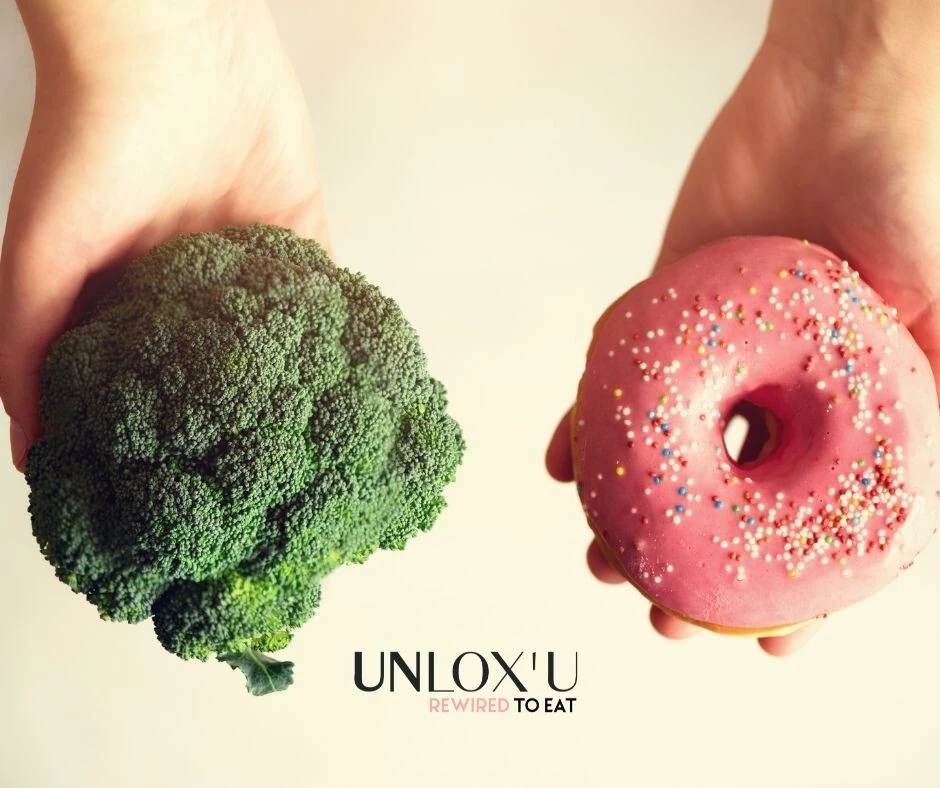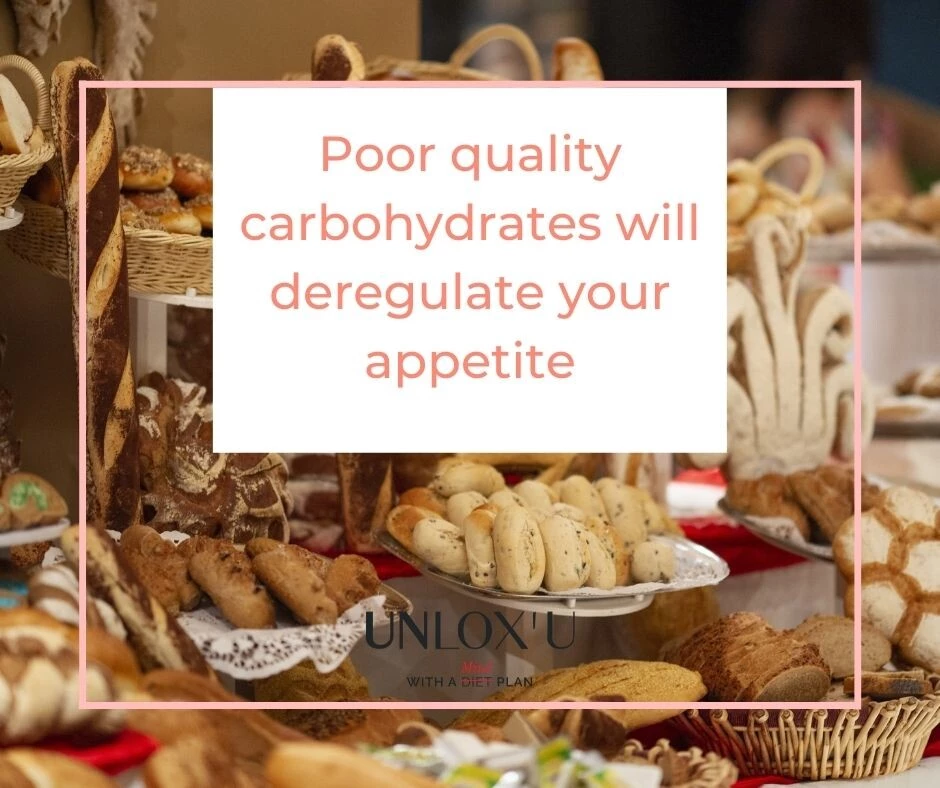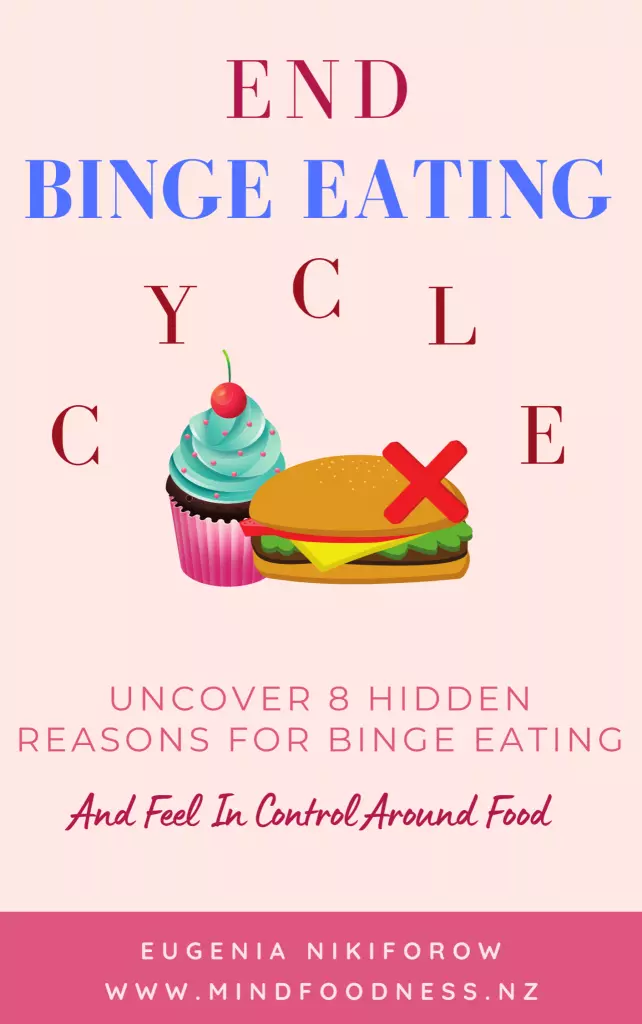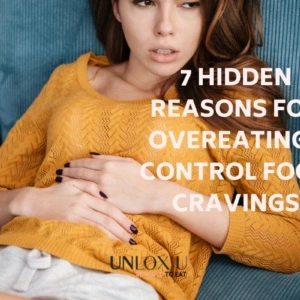Why Do I Overeat? [Avoid These Mistakes]
Why do I overeat? So many of us want to take control of food and regulate our appetite. If you have an unregulated appetite you might experience overeating, food cravings, binge eating, and emotional eating. Essentially, this unregulated experience causes us to eat on autopilot rather than what we know we should eat. It’s critical to know and understand that NONE of these behaviors have anything to do with willpower or a lack thereof. This is because nutrition is an individualised experienced, whilst being nuanced with many layers. Let me explore this further…

So, what are the two nutritional aspects of overeating (or appetite deregulation)?
1/ Sugar (Stimulates The Appetite)
Now by sugar, I mean any food that has an excessive amount of sugar. For example candy, juices, dried fruits, breakfast cereal, or sugary drinks. Basically, this includes anything that contains a lot of sucrose, fructose, and glucose. Notably, when we eat sugar, we want more sugar. This is because our brain releases dopamine (which is a hormone that makes us addicted to feeling good). Essentially, it stimulates the brain so we feel high and happy and want more. Sounds familiar?

Evolutionary This Made Sense
In the past (think hunter-gatherer days), when sugar was available, it was usually only in fruits and berries because there were no supermarkets to buy chocolate. The fruit was generally available in abundance towards the end of summer (or just before winter). Our bodies naturally wanted to consume that fruit or sugar. Both because it tastes good and we gain more weight and fat in preparation for the cold winter. Further, the dopamine from the sugar also encouraged us to eat, hunt, and gather more. It’s a hormone that makes us want more and often stops us from feeling completely satisfied.
Today’s Problem
The problem we face today is the abundant availability of sugar, in particular within processed foods. Essentially, our brain is constantly stimulated and bombarded by the dopamine hormone that causes more cravings. Can you see the cycle? Clearly, this makes it difficult because our body keeps craving. The more sugar we eat, the more sugar we want. Obviously, the solution to breaking this cycle is eating less sugar.

The Solution
Eliminate sugar for at least two weeks and you will notice a big difference. It doesn’t mean never eating sugar again. It means learning to eat in smaller amounts and less frequently so that it doesn’t hijack your appetite. (You can continue eating fruit, just combine it with nuts or nut butter for protein to stabilize your blood sugar). More on that here.
2/ Poor Quality Carbohydrates
Secondly, poor quality carbohydrates are foods that will also deregulate your appetite. These foods include white bread, pasta, white flour, chips, cookies, and breakfast cereal. Basically, the excess amounts of simple carbohydrates make us crave more food.

Simple Processed Carbohydrates Cause You To Overeat
For example, have you ever noticed when you eat white bread you could endlessly continue to eat it without feeling full? Essentially, calorie-wise, you consumed enough for your body and yet, 60 minutes later, we are hungry again.
The dilemma is also that these foods don’t have many nutrients. If our diet is mostly low nutrients – dense food, over time we can become nutrient deficient as well. A diet high in these foods will create a body starved of nutrients but overfed with empty calories. Moreover, the protein compound in most of these foods contains gluten which gives us a sense of feeling ‘high’ which makes us want to eat more.
What Does The Research Say?
Research shows, that people who start their day with a breakfast like juice, cereal, white bread, and jam, will continue eating more calories during the day. They will crave more sugar and more carbohydrates. Moreover, they will be stuck in a blood sugar roller coaster which can lead to food cravings, binge eating, and likely afternoon and night-time cravings. Long term, this can lead to diabetes, weight gain, insulin intolerance, and many other health issues.

So, What Can You Do If You Overeat?
Start your day with more protein-dense and healthy-fatty food. This will lead to consuming fewer calories throughout the day, your blood sugar will stabilize and your weight will be much healthier. This way of eating will also mean fewer mood swings, heightened focus, and a more regulated appetite. For more on what exactly to eat, check out my Balanced Diet Framework.
To Be Clear, I Am Not Anti-Sugar or Anti-Carbs
This is not about demonizing foods. Rather, it’s about making informed decisions for you. Knowing what works and what does not. Essentially, when we understand the biochemistry of the body we can take control back. It’s not about fighting your appetite but bringing more food into your diet that creates an easy way to eat well that supports your life, your health, and well-being.

Why Do I Overeat? Calibrate Your Hunger
When clients join us, we always start with calibrating their hunger. This is where they learn what to eat, when to eat and how to eat. It’s understanding the food they eat and how it affects their body and cravings. It’s about getting their body into a space of equilibrium where healthy eating comes easier and more natural to them. Plus, they gain the tools to manage overeating triggers and the cravings disappear. For more support send me a message or join my free Facebook group here – Binge Eating And Emotional Eating – Unlox’U Support Group.

8 KEY STEPS TO
FEEL IN CONTROL WITH FOOD &
Regain power over food!
Binge eating and emotional eating is not a food problem, it is an emotional problem.
We can’t rely on will-power to stop binge eating. In this e-book I am addressing the underlying reasons why we use food as a drug and what our body is trying to tell us.



